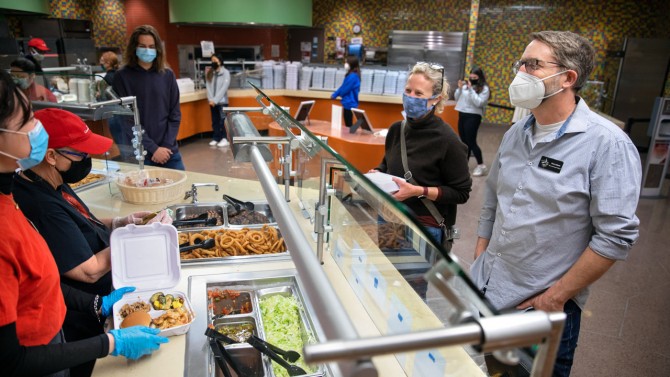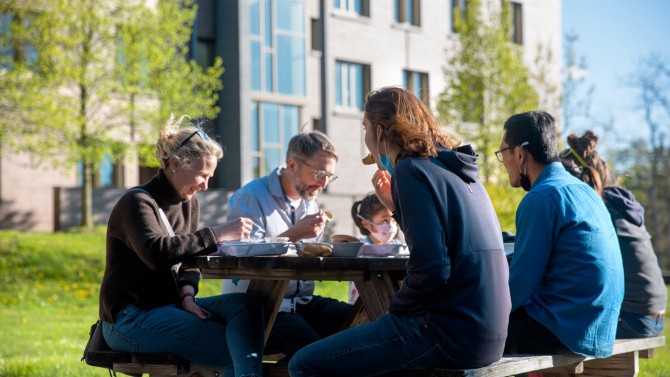
Steven Jackson, left, associate professor of information science in the Cornell Ann S. Bowers College of Computing and Information Science, is handing over the reins as professor-dean of Keeton House to C. Lindsay Anderson, associate professor of biological and environmental engineering in the College of Agriculture and Life Sciences. Jackson has been house professor-dean at Keeton since 2015.
West Campus house professor reflects on immersive six years
By Tom Fleischman
A chance meeting in a hallway, a conversation about music over dinner, living-room discussions – they were ordinary, everyday occurrences, but for Steven Jackson they were the best part of living at William Keeton House.
Life as one of five house professor-deans on West Campus has given Jackson, associate professor of information science in the Cornell Ann S. Bowers College of Computing and Information Science, a glimpse into undergraduate life he couldn’t have gotten any other way. And when his six-year tenure ends this month, he will leave a different person from the one who moved in.
“There are very few places in the university where you get a true cross section of the community, and a sense of the place as a whole,” Jackson says. “West Campus is one of them, and I’ll be forever grateful for the experience.”
C. Lindsay Anderson, associate professor of biological and environmental engineering in the College of Agriculture and Life Sciences, will take over for Jackson at Keeton House. Anderson and her family will move in in August.
Each year, Cornell faculty members – often with their families and pets – join students as members of living-learning communities on North and West campuses. Faculty-in-residence live with first-year communities on North Campus; house professor-deans (HPDs) live with upper-level students in the West Campus House System.
“The opportunity to share a meal, participate in a stimulating discussion in the house professor’s apartment or join them kayaking creates opportunities for informal mentoring, unique learning opportunities and building confidence,” says Ethan Stephenson, director of faculty living-learning programs in the Office of the Vice Provost for Undergraduate Education, which oversees all resident faculty.
“And faculty who serve as house professor-deans get to see the student experience outside of the formal learning spaces,” he says, “which gives them important insights that often inform their teaching and advising.”
Feeling the semester’s rhythms
Jackson says his understanding and appreciation of the undergraduate experience grew “immeasurably” during his residency.
“You really get to see and feel the rhythms of the semester,” says Jackson, who has lived with his family – partner Kary, teenaged children Oliver and Lucia, dogs Cash, Charlie and Francis, and cat, Pi – at Keeton since July 2015. “You can almost feel when prelim season starts, or when there’s some big assignment or problem due in one of the big undergraduate courses. You feel the excitement of the launch of the fall semester, and the release as people come up on the end of the spring semester.
“I feel like I have a fundamentally different sense of the place,” he says, “from what I had before in my regular faculty role.”
The West Campus system opened in 2004 with Alice Cook House; over the next five years, it expanded to include five houses with more than 1,500 students. The leadership of each house and the shared leadership of the house system resides in five residential HPDs, who are tenured Cornell faculty.
In addition to Jackson, current house professor-deans are:
- Hans Bethe House: Andrew Hicks, associate professor of music in the College of Arts and Sciences;
- Flora Rose House: Rosemary Avery, professor of policy analysis and management in the College of Human Ecology;
- Carl Becker House: Neema Kudva, associate professor in the College of Architecture, Art and Planning and associate dean of the faculty; and
- Alice Cook House: Shorna Allred, associate professor of natural resources and the environment in the College of Agriculture and Life Sciences.
Each HPD runs their house in collaboration with the house assistant dean, a student affairs professional who oversees day-to-day operations. Undergraduate and graduate staff live on the student floors; each house has a dining room and a house office.
A total of 30 faculty, staff and community members are appointed by the HPD as house fellows, who participate in events, meals and informal mentoring of residents.
Inspiring, humbling
Jackson says a healthy curiosity about his surroundings served him well as a professor-dean living alongside 300 undergraduates.
“There’s the interdisciplinary curiosity across areas of work, which you get from interactions with students and house fellows,” he says. “Then there’s the range of experiences involved – the [students’] different backgrounds, and different ways of interpreting and reacting to events in the world. These include the hard ones, which we’ve had a few of these past few years.
“It’s been inspiring and somewhat humbling to watch the students navigate these, both individually and collectively,” he says.
Jackson tried to help students find a balance between their studies and everything else that makes college life memorable.
“These six years have made me appreciate how hard our students work – and how much better it might be if we could all help them to work slightly less hard from time to time, and to take a break,” he says. “There’s so much to experience at the university beyond the books. The world will still be waiting when they come back.”
Anderson, who’s also a faculty director at the Cornell Atkinson Center for Sustainability, is excited about the prospect of joining the Keeton House community.
“This is something that my family and I have wanted to do for a long time,” says Anderson, whose husband, Christopher Anderson, is a professor in the School of Hotel Administration. Their two youngest sons, 16-year-old Wiley and 13-year-old Koen, will join them at Keeton; eldest son Carter, 18, is attending Williams College in the fall.
“Over the last several years, Chris and I have both been house fellows on West Campus and enjoyed interacting with the students and community in general,” she says. “Our kids loved it, too. … For us, this was definitely a family decision.”
Anderson, whose teaching and research focus on energy and the environment, will bring a sustainability mindset to her role as Keeton HPD – and not just environmental sustainability, she says, but also personal sustainability.
“While my research is more related to the specifics of sustainable energy systems, I would like to take this opportunity to engage with students on a broader definition of sustainability,” she says. “The fresh ideas we need to address societies’ biggest problems are going to come from young people – diverse perspectives that come from interacting, discussing and thinking outside the classroom and laboratory, with people who have different academic and person backgrounds.”
When asked for any advice for his successor, Jackson had one word: “Pets – lots and lots of pets.”
Anderson and family have that covered, she said, with Jinx, a 6-year-old Great Dane, and Bella and Oliver, black cats “of indeterminate age.”
Media Contact
Get Cornell news delivered right to your inbox.
Subscribe


